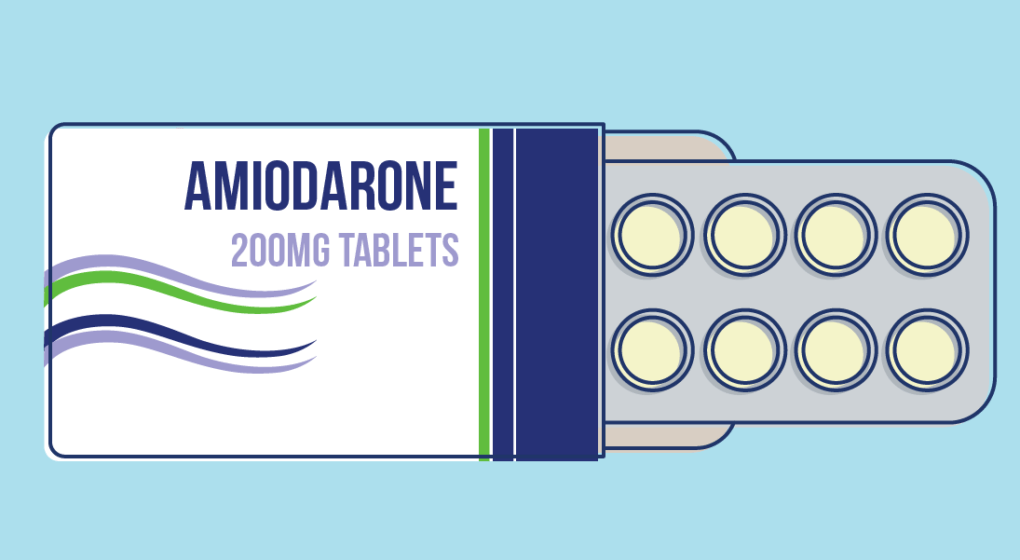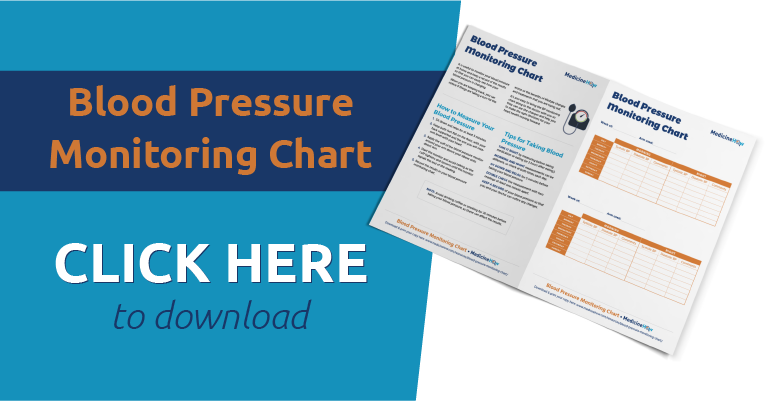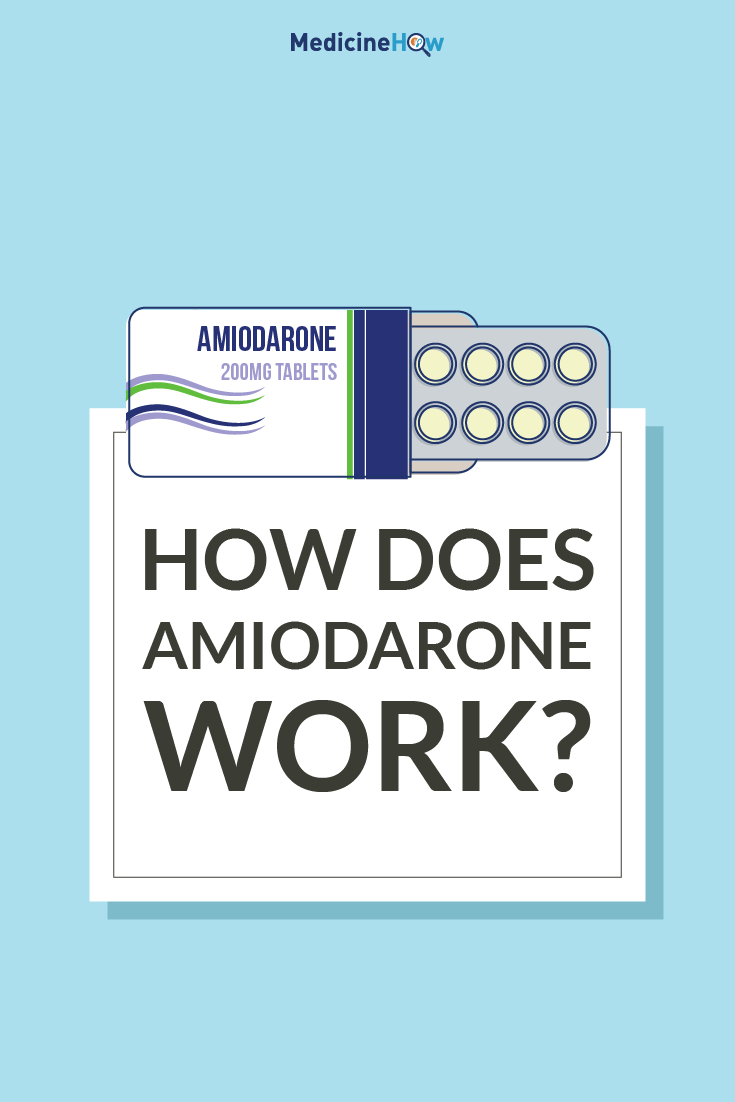
Amiodarone is an anti-arrhythmic drug that helps to control the rhythm of the heart beat. It does this in a number of ways by changing the electrical activity in the heart.
One of the unique characteristics about amiodarone is its slow time to action and length of action in the body. It can take several weeks for the full effect of the drug to become obvious (you may notice side effects some time after you started taking the medication) and it can take a few month for the drug to be completely excreted from your body.

Brand Names and Doses
![]() Amiodarone is the name of the active ingredient in the medication, also known as the generic name. You might also know it by a brand name, which is the name given to it by the manufacturing company, such as Aratac or Cordarone.
Amiodarone is the name of the active ingredient in the medication, also known as the generic name. You might also know it by a brand name, which is the name given to it by the manufacturing company, such as Aratac or Cordarone.
Both of these brands are available in two doses: 100 mg and 200 mg.
Usually when you begin taking amiodarone, your doctor will recommend you to start with a relatively high dose, which will gradually be reduced. For example, you might start with 200 mg three times a day, then reduce it to twice a day and finally once a day. This is to make sure that your body gets a good dose of the medication to protect your heart at the beginning when it needs it, and then just “topping up” the dose to make sure it is still effective.
Cordarone is also available as an injection (50 mg/mL), but this would only be used in a hospital setting.
What is it used for?
![]() Amiodarone is used to keep your heart beating at the right pace and stop it from going too fast. It can treat or prevent:
Amiodarone is used to keep your heart beating at the right pace and stop it from going too fast. It can treat or prevent:
- Ventricular tachyarrhythmias
- Atrial tachyarrhythmias
- Supraventricular tachyarrhythmias
Sometimes, the other medications you are taking may increase the risk that you heartbeat will jump out of rhythm, and your doctor might recommend that you take amiodarone to prevent this from happening.
How does amiodarone work?
![]() In order for each heart beat to occur, there are many electrical impulses that move from one area of the heart to another. These impulses eventually cause the heart muscles to contract together and push the blood out of the heart and around the body.
In order for each heart beat to occur, there are many electrical impulses that move from one area of the heart to another. These impulses eventually cause the heart muscles to contract together and push the blood out of the heart and around the body.
Amiodarone works in several different ways to control the electrical impulses in your heart and keep it beating at the right pace.
Firstly, it extends the action potential refractory period in the heart. Each time the electrical signals are activated by reaching the action potential, they go through a refractory period where they are “decharged” and it is much harder for them to become activated again. When your take amiodarone, this period lasts for longer, which means that it will take longer for the muscles to contract and your heart to beat again.
It also inhibits the fast sodium channel in the heart muscle and inhibits the slow inward calcium current, so that the conductivity of the atrioventricular and bypass tract is reduced.
Additionally, it has a weak action as a beta blocker, which is a specific class of drugs that lowers the heart rate.
All of these effects combined together mean that it can help to control the heart rate. However, the broad action also means that it can have a number of adverse effects on your body.
Side Effects
![]() Most of the side effects occur because the dose is too high. However, it is a very slow acting drug so by the time you notice the effects, you may need to wait a few weeks for your body to eliminate the drug and for you to feel better again.
Most of the side effects occur because the dose is too high. However, it is a very slow acting drug so by the time you notice the effects, you may need to wait a few weeks for your body to eliminate the drug and for you to feel better again.
In some cases, amiodarone can also cause or worsen arrhythmias so it should be used with caution. Other side effects may include:
- Thyroid imbalance (hyperthyroidism or hypothyroidism)
- Pulmonary alveolitis or pulmonary fibrosis
- Benign corneal microdeposits
- Nausea and vomiting
- Peripheral neuropahty
- Central nervous system disturbances (e.g. nightmares or vivid dreams)
- Taste disturbances
- Fatigue
- Skin discoloration
- Sensitivity to sunlight
It is recommended to protect your skin from UV rays and sunlight while taking amiodarone. You are more likely to have sensitive skin, which can become burnt and damaged easily.
Precautions
![]() There are some cases when amiodarone should not be used or should be used with extra caution. If you think one of these might apply to you, you should talk to your doctor before taking amiodarone.
There are some cases when amiodarone should not be used or should be used with extra caution. If you think one of these might apply to you, you should talk to your doctor before taking amiodarone.
Amiodarone is contraindicated if you are allergic to the drug or if you do not have a pacemaker and you have:
- Second or third degree heart block
- Symptomatic bradycardia
- Sick sinus syndrome
Additionally, you are more likely to suffer from side effects if you have:
- Thyroid dysfunction (hypothyroidism or hyperthyroidism)
- Lung disease
- Electrolyte imbalance
Finally, you may need a reduced dose if you have poor liver or hepatic function because your body will take longer to excrete the drug from your body.
Drug Interactions
![]() Amiodarone can interact with many other medications that your may be taking. Below is a list of the known drug interaction and how they will affect you.
Amiodarone can interact with many other medications that your may be taking. Below is a list of the known drug interaction and how they will affect you.
- Cholesteramine can reduce the concentration of amiodarone in your body, so that it wont work as well as usual. It’s best not to use them together, but you may be able to take both if you separate the dose and/or increase the dose of amiodarone.
- Amiodarone can increase the concentration of cyclosporin, meaning that your will be more likely to experience side effects of cyclosporin. To manage this, the dose of cyclosporin can be reduced.
- Amiodarone can increase the concentration of dabigatran and you will be more likely to have side effects (such as increased bleeding risk). The best way to manage this is by decreasing the dose of dabigatran.
- Amiodarone and increase the concentration of digoxin and increase the risk of side effects. They both also act on the heart so can have additive effects. It’s best not to use them together, or to reduce the dose of digoxin.
- Amiodarone can increase the concentration of eplerenone and the risk of side effects such as hyperkalemia. For this reason, the potassium concentration in your blood should be monitored and the dose of eplerenone can be reduced, if needed.
- Amiodarone can increase the concentration of flecanide and the risk of side effects. If possible, these shouldn’t be used together or the dose of flecanide can be reduced.
- Indinavir can increase the concentration of amiodarone in your body and the risk of side effects. If possible, these shouldn’t be used together or the dose of amiodarone can be reduced.
- Amiodarone can increase the concentration of metoprolol and the risk of side effects such as bradycardia (low heart rate). To manage this, the metoprolol dose can slowly be reduced until the right balance is reached.
- Both phenytoin and amiodarone can effect each other in the body, increase the risks of side effects of phenytoin and reducing the efficacy of amiodarone. The best way to act depends on the case and you may need to have the dose of the pheytoin reduced or the amiodarone increased.
- Ritonavir can increase the concentration of amiodarone and the risk of side effects. It is best not to use these two drugs together, if possible.
- Amiodarone can increase the concentration of simvastatin and the risk of side effects such as myopathy (muscle pain). In most cases, it’s best to use a different statin drug that doesn’t interact with amiodarone, such as pravastatin.
- Amiodarone can increase concentration of warfarin and the risk of side effects such as bleeding. This can be managed by reducing the dose of warfarin.

Pregnancy and Breastfeeding
![]() Amiodarone can have serious effects for the infant if used by pregnant women, such as thyroid dysfuntion and bradycardia (low heart rate). It is not, therefore, recommended.
Amiodarone can have serious effects for the infant if used by pregnant women, such as thyroid dysfuntion and bradycardia (low heart rate). It is not, therefore, recommended.
As it is such as slow acting medication, you should stop taking it at least three months before planning to start a family, as it can take several months for the drug to be excreted from the body.
Amiodarone should also be avoided for women who are breastfeeding, as it may effect the infant.
Pin it!


